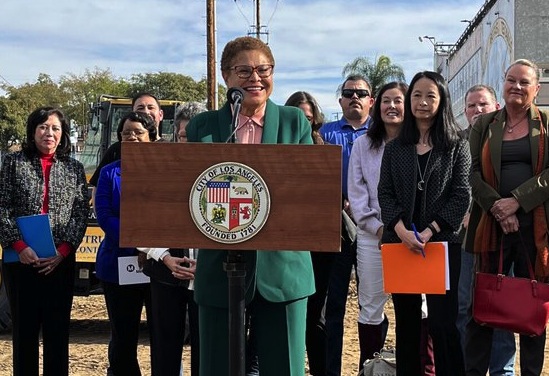Wave Wire Services
LOS ANGELES — Mayor Karen Bass has signed an executive directive expediting the approval and permitting process for fully affordable housing projects in Los Angeles.
The executive directive comes days after Bass signed an emergency declaration on homelessness as her first act as mayor. The declaration — which is scheduled to last six months — allows Bass to take more aggressive executive actions to confront the crisis.
Under the directive, city departments must conduct all reviews and issue approvals for 100% affordable housing projects within 60 days. Once construction starts, the utility permitting and certificate of occupancy process must be completed within five days for affordable housing units and two days for temporary housing.
“That is the urgency we need at City Hall, and that is what we are delivering,” Bass said at a briefing Dec. 16.
Bass signed the directive at the future site of Lorena Plaza Apartments, a 7,500-square-foot development containing 49 apartments — 36 of them for people experiencing homelessness and their families — in East Los Angeles that took 16 years to break ground.
“How on earth could we expect to house 40,000 people if we continue business as usual?” Bass said.
Los Angeles County Supervisor Hilda Solis said the Board of Supervisors share the mayor’s commitment to “shattering the bureaucratic barriers that prevent us from addressing” the city’s housing crisis.
“This is what has been needed,” said Stephanie Wiggins, chief executive officer of the Metropolitan Transportation Authority. “It’s been great to witness in just five quick days. The message of urgency meets the action of urgency.”
The directive also exempts fully affordable housing projects from certain review processes required under the city’s zoning provisions, such as site plan reviews, as long as the project does not contain zoning changes. It also gives affordable housing developers more incentives to add units under the state’s density bonus law.
Bass directed the Los Angeles Housing Department to coordinate with the city controller’s office to track and process all affordable housing projects, and expedite the payment process for applications.
Developers are currently building projects with fewer units because they don’t want to deal with a “maze of additional city steps” for larger affordable housing projects, according to Bass.
“Everyone knows that time is money,” Bass said.
She said the directive will help reduce the amount of red tape and speed up the construction timeline, “saving precious dollars that can then be invested in more housing and more solutions for our homelessness crisis.”
There are 24 projects in the pipeline that will see immediate benefits from the directive, according to Bass.
The City Council, which ratified Bass’ declaration of emergency on homelessness Dec. 14, will have to keep signing off on it every 30 days.
“The setting of a specific time frame allows for actions to be taken to make permanent, necessary structural changes,” the declaration reads.
Whether to continue the state of emergency will be evaluated by several indicators of progress, including the number of encampments and housing placements, and how much more flexibility city departments are allowed through the declaration. There are an estimated 41,980 unhoused people in the city of Los Angeles, up 1.7% from 2020, according to the latest count by the Los Angeles Homeless Services Authority.
Bass said that she plans to announce a program to address homelessness called Inside Safe. The plan, which Bass said will cost under $100 million, will be to use master leasing with motels to place unhoused people. She said her office has been in touch with motel owners near encampments.
Dora Leong Gallo, president and CEO of A Community of Friends, helped get the Lorena Plaza project across the finish line. Gallo said the process was slowed by “one hurdle after another.” There were more than 30 clearances, environmental litigation and multiple city departments involved.
“This experience amongst affordable housing developers is not unique, but it is so unnecessary,” Gallo said. “With one pen stroke, we will eliminate much — if not all — of what stopped us from providing affordable homes to people faster.”











